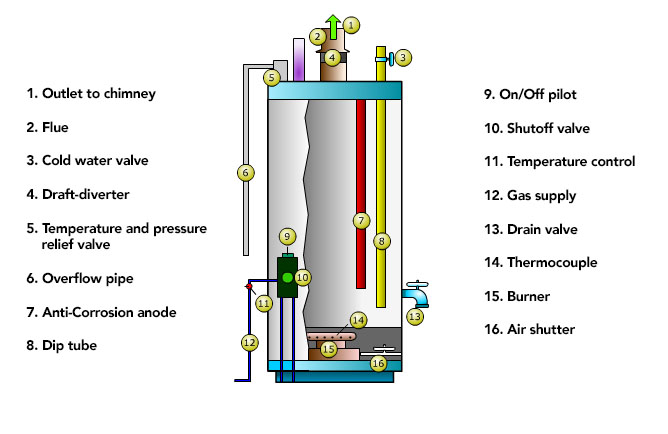How you can help your water heater live a long and healthy life
Regular maintenance of your water heater can help extend its lifespan, improve energy efficiency, and ensure that it operates effectively. Here are some general guidelines for maintaining a water heater:
1. Read the Manufacturer’s Instructions:
- Always follow the manufacturer’s guidelines and recommendations for maintenance specific to your water heater model.
2. Check for Leaks:
- Regularly inspect the area around the water heater for any signs of leaks. If you notice water pooling or dampness, address the issue promptly to prevent further damage.
3. Flush the Tank:
- Sediment can accumulate at the bottom of the tank over time, reducing the heater’s efficiency. Drain and flush the tank at least once a year to remove sediment. Follow these steps:
- Turn off the power supply (electricity or gas) to the water heater.
- Connect a hose to the drain valve at the bottom of the tank.
- Open the valve and allow the water to flush out. Be cautious as the water may be hot.
- Close the valve and refill the tank.
- Sediment can accumulate at the bottom of the tank over time, reducing the heater’s efficiency. Drain and flush the tank at least once a year to remove sediment. Follow these steps:
4. Test the Pressure Relief Valve:
- The pressure relief valve helps prevent excessive pressure buildup in the tank. Test it annually:
- Turn off the power supply to the water heater.
- Lift the valve’s lever to allow some water to discharge.
- Release the lever and ensure that it closes tightly.
- The pressure relief valve helps prevent excessive pressure buildup in the tank. Test it annually:
5. Check the Anode Rod:
- The anode rod helps prevent corrosion within the tank. Check it annually and replace it if needed. Follow these steps:
- Turn off the power supply to the water heater.
- Locate the anode rod’s access point on the top of the heater.
- Use a wrench to loosen and remove the rod. If it’s less than ½ inch thick or has a significant amount of corrosion, replace it.
- The anode rod helps prevent corrosion within the tank. Check it annually and replace it if needed. Follow these steps:
6. Insulate the Pipes and Tank:
- Insulating the hot water pipes and, if applicable, the water heater tank can reduce heat loss and improve energy efficiency.
7. Adjust the Temperature:
- Set the water heater temperature to a safe and energy-efficient level, typically around 120 degrees Fahrenheit (49 degrees Celsius).
8. Check for Strange Noises:
- Unusual sounds from the water heater may indicate issues such as sediment buildup or a malfunctioning heating element. If you hear strange noises, investigate and address the cause.
If you are unsure or uncomfortable performing any of these maintenance tasks, consider hiring a professional plumber or technician to inspect and service your water heater. Regular maintenance can help prevent unexpected issues and ensure your water heater operates efficiently.

